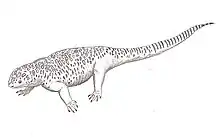Asaphestera
Asaphestera is an extinct genus of a tetrapod described on the basis of fossils from the Carboniferous of the Joggins locality in Nova Scotia, Canada. It was originally described as an undetermined lepospondyl[1] and subsequently classified as a microsaur within the family Tuditanidae.[2] A study published in May 2020 found that specimens referred to Asaphestera represented several unrelated species. Steen (1934)'s original species name Asaphestera platyris was retained for a skull which has been re-evlatuated as the earliest known synapsid.[1][3]
| Asaphestera | |
|---|---|
 | |
| Scientific classification | |
| Kingdom: | Animalia |
| Phylum: | Chordata |
| Clade: | Synapsida |
| Genus: | †Asaphestera Steen, 1934 |
| Type species | |
| †Asaphestera platyris Steen, 1934 | |
The type species of Asaphestera is Asaphestera platyris, named by Steen (1934) based on three skulls. Carroll & Gaskill (1978) noted that one of the skulls was briefly named as the species "Hylerpeton" intermedium by Dawson (1894), though it is no longer consider related to the genus Hylerpeton. According to Dawson's species name, they renamed Asaphestera platyris to Asaphestera intermedia.[4]
Mann et al. (2020) re-evaluated purported Joggins microsaurs and found several unusual results. One of the skulls assigned the name Asaphestera platyris by Steen appeared to be a valid taxon, but instead of a microsaur it was the oldest known synapsid, possibly an eothyridid. Dawson's "Hylerpeton" intermedium was determined to be an indeterminate tetrapod and a nomen dubium. Additional Asaphestera material was named as a new genus of microsaur, Steenerpeton.[3]
References
- Steen, Margaret C. (1934). "The amphibian fauna from the South Joggins. Nova Scotia". Journal of Zoology. 104 (3): 465–504. doi:10.1111/j.1096-3642.1934.tb01644.x.
- "†Asaphestera Steen 1934". Paleobiology Database. Fossilworks. Retrieved 25 September 2017.
- Mann, Arjan; Gee, Bryan M.; Pardo, Jason D.; Marjanović, David; Adams, Gabrielle R.; Calthorpe, Ami S.; Maddin, Hillary C.; Anderson, Jason S. (5 May 2020). Sansom, Robert (ed.). "Reassessment of historic 'microsaurs' from Joggins, Nova Scotia, reveals hidden diversity in the earliest amniote ecosystem". Papers in Palaeontology. Wiley. doi:10.1002/spp2.1316. ISSN 2056-2802.
- Carroll, Robert L.; Gaskill, Pamela (1978). "The Order Microsauria". Memoirs of the American Philosophical Society. 126: 1–211.



